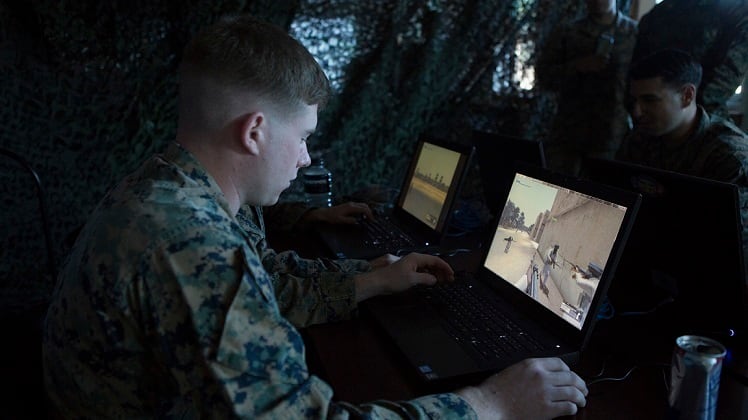Marines across the fleet will soon be able to strap on goggles and train call for fire missions at any time and in any place.
The goggles, known as mobile fire support trainers, are an advanced version of the augmented immersive team trainer program that saw testing by Marines in late 2016.
The device allows a Marine to 3-D map an area, whether a barracks parking lot, soccer field or beach, and place virtual tanks and other targets on the real background.
RELATED

The Marine then calls for indirect fires on those targets. When there’s a hit the actual damage that he or she would see in real life unfolds. This helps Marines better understand how their decisions play out on a fire mission and helps give a more realistic battle damage assessment, a core part of fire mission intelligence.
“Currently Marines cannot see simulated battlefield effects, such as munitions explosions,” Koren Odermann, deputy team lead for range training systems at Marine Corps Systems Command, wrote in an email.
Adding the support trainers helps squad leaders with tactical decision-making skills, she wrote. The aims of the program are to provide more realistic training at a fraction of live-fire training costs, enable more elements of the infantry battalion to train together and improve efficiency in call for fire skills.
The mobile fire support trainers is set to field by late fiscal year 2019 to at least a dozen Marine Corps facilities across the globe. There will be about one device per platoon-sized unit in the Corps’ ground combat forces, and more than 600 devices will be available to platoon-sized, said Col. Walt Yates, program manager for Training Systems at Marine Corps Systems Command.
The devices will be distributed nearly every major Marine installation from Marine Corps Bases in Hawaii, California and North Carolina. From The Basic School in Quantico, Virginia, to the Marine detachment at the Fort Sill, Oklahoma, artillery school.
These include both training areas and schoolhouses where close-air support and other Joint Terminal Attack Controller skills are taught.
With compact size and low amount of supporting equipment, the device needs only a helmet-mounted display, battery pack and laptop, so it is likely if Marine Expeditionary Units want to take it afloat, they can.
Todd South has written about crime, courts, government and the military for multiple publications since 2004 and was named a 2014 Pulitzer finalist for a co-written project on witness intimidation. Todd is a Marine veteran of the Iraq War.



